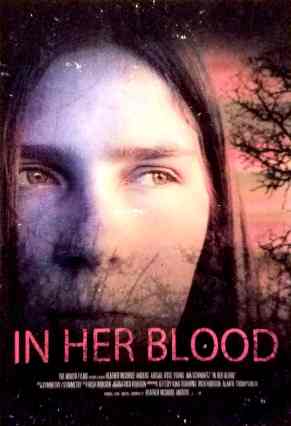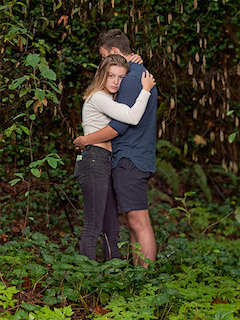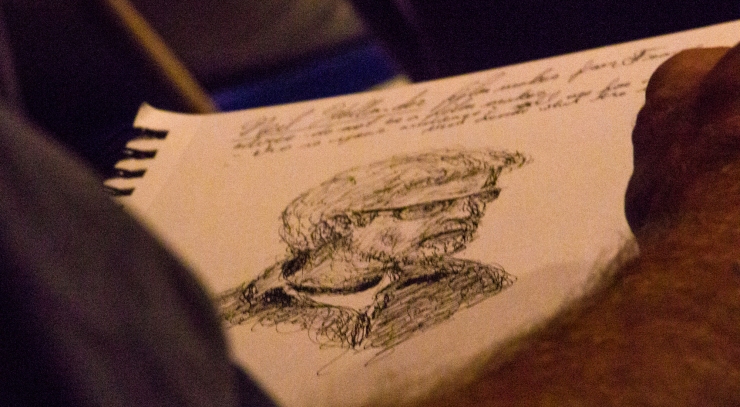
This is an article based on the interview with Heather McBride-Anders, story writer, director, and producer of the psycho-thriller film, “In Her Blood”. that premiered at Lane Community College (LCC) Ragozzino Performance Hall on November 3rd, 2017. The idea for this interview is to show aspiring filmmakers part of the process of filmmaking through Heather’s experience with In Her Blood.
It was a labor of love that she first began at a continuing ed screenwriting class at LCC about 10 years ago. At yhr time Heather was going through a separation she and was able to put her focus into writing, the story that came out eventually became “In Her Blood” is partially based off of her life and mostly fiction. Several years later and after submitting her finished screenplay in for a contest in Hollywood, Heather was contacted by Danny Mannis, who wrote the movie iFrankenstein. Mannis consulted her on her screenplay and Heather used this advice to make some edits, finalized the screenplay and resolved that she would make it into a film.
With this screenplay and being in charge of producing and directing the film, Heather was able to achieve some crowdfunding and then used her own money to fund a majority of the film. Next step, find a cast and crew! Heather went to Lane Community College to meet with Teresa Hughes, professor in the Media Arts program to ask her if there were any students looking for internship opportunities. Three of the LCC interning crew were Rich Robison, Alan R. Thompson and Jeffrey King Osborns who did numerous jobs including cinematography, set design, prop creation and more. “There is a certain amount of giftedness in that group of those 3 guys, their synergy, you know. So I think I accidentally landed upon some genius.” Overall the film took 5 months, 14 actors, and 23 locations and don’t forget crew (for which I don’t have a figure). The main location for the film, an old 1888 victorian home called the Shelton McMurphey Johnson House was lent by its board for free, for over a month for filming. This house is a tourist attraction in Eugene OR. “The place had some pretty freaky energy”, said Heather. Making it the perfect place for a film setting such as this. Another location used during the shoot that has an interesting back story was a fraternity house on Alder Street called the Lorax Manor. This place was perfect, there was a basement there that already had meat hooks attached to the ceiling, a cage, old dirty mattresses, tools were strewn about the room everywhere and there was a pool table in there that looked like it was about a hundred years old. The set design was basically already done for them, so Heather saw the perfect mess and said, “Alan, go in there and make the set!”. He fixed it up perfectly for a lovely day of shooting film. You’ll know the scene when you’ve seen it.
Heather McBride-Anders projects energy and pride when talking about the film and especially when talking about her team she spent over 6 months with while making the film. From start to finish creating a movie was not without their fair share of struggle. Heather shares that writing can be long and agonizing. “It took 10 years and you get really attached to the writing and you don’t know if it is good enough.” The post production process also turned out to take much longer for unexpected reasons, but she comments, “Working with a crew is so tiring but it is like being on a high from morning to night. When you get a shot, people would be celebrating and then, “move on!” Energy and ideas happened.” Heather goes on to explain that there was the occasional clash of egos that happened on set that had to do with creative decisions. “…but you have to have a little bit of ego starting out to survive the constant onslaught of people’s opinions and if you don’t stay true to yourself then you lose your art.” This is good advice for someone starting out, stay open to the ideas of your team and also stay true to your ideas because there will always be varying opinions.
What I really like about Heather is that she used the internet to learn to do anything that she didn’t know how to do, she learned to make things. One of the challenges was learning how to make realistic bodies for a scene in the movie. Instead she found an easy method to make heads in jars for a scene instead of complete bodies while browsing the popular website, Pinterest. Alan Thompson did the work to bring these heads to life. Heather’s advice to filmmakers starting out is to “Leave your mind open and start exploring on the internet!” She has reroofed her house and fixed a fridge and more from tutorials online. Much of the knowledge she used to learn to make to make this movie a reality came from online resources as well. Some sites she mentioned specifically were YouTube, Pinterest, and frugalfilmmaker.com.
Heather’s biggest takeaway lesson from producing “In Her Blood” was regarding sound. As a filmmaker you may have heard about the importance of quality sound, I certainly have but we can benefit from hearing it from a first-hand account. Heather tells us that she was so focused on the filming and video aspects of the film that the focus on audio was minimized, so the postproduction process was extended for about 2 months. Here’s her specific advice regarding managing your sound production process:
- Test audio ahead of time.
- Use external audio.
- Always sync your audio with video at the end of the day.
- Don’t start editing your video until your audio is synced with the video.
- Use either Mac or PC to do your edits on since these two platforms don’t “talk” with eachother easily or well.
Jumping into a film project is going to be a rewarding and challenging process! Trust your gut and your creative capabilities, get help and work with people and use your resources to your advantage, there is tons of help out there waiting for you online and through organizations such as Lane Community College and other people willing to help you for cheap or free such as the board of the Shelton McMurphy Johnson House. My hope is that this article enlighted you to some of the rewards and challenges of being a first time filmmaker.
Thanks for reading!
By Daniel Martinez










